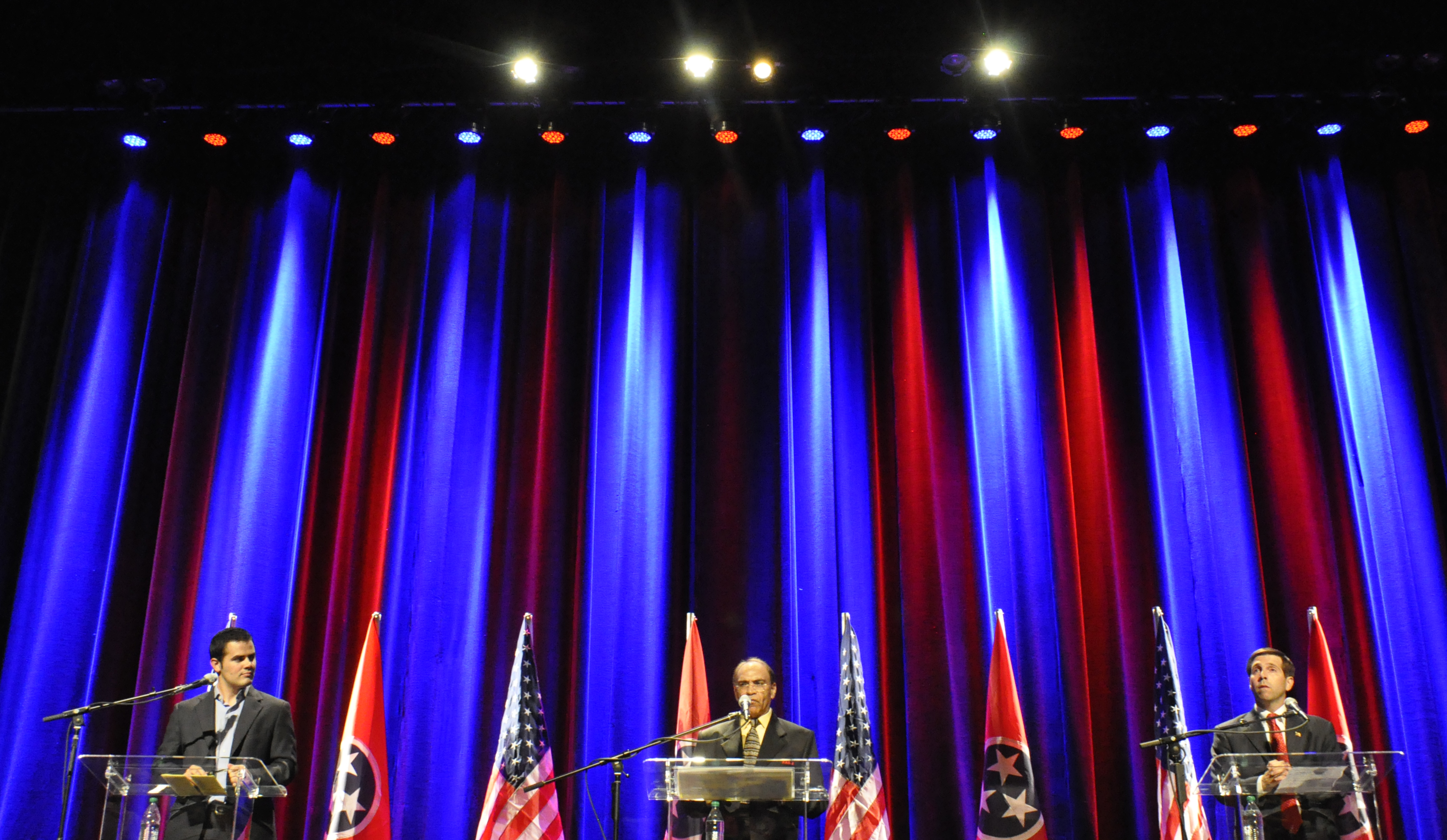Republican candidates divided on no-tax-increase pledge
Friday, January 1, 1904
 Republican candidates for the 3rd Congressional District, from left, Weston Wamp, Ron Bhalla and current U.S. Rep. Chuck Fleischmann participate in the 3rd Congressional District Republican Debate held on Monday, May 21, 2012, at the University of Tennessee at Chattanooga's Roland Hayes Concert Hall in downtown Chattanooga, Tenn.
Republican candidates for the 3rd Congressional District, from left, Weston Wamp, Ron Bhalla and current U.S. Rep. Chuck Fleischmann participate in the 3rd Congressional District Republican Debate held on Monday, May 21, 2012, at the University of Tennessee at Chattanooga's Roland Hayes Concert Hall in downtown Chattanooga, Tenn.WHAT ABOUT THE OTHER SIDE?The Democrats are divided on taxes, too.• Bill Taylor, a Chattanooga businessman running in the 3rd District Democratic primary, has said tax rates "do not need to be increased." On his website, he writes that "revenues need to rise" by eliminating unnecessary loopholes -- a popular Republican refrain."There are 165 deductions, exemptions, preferences and loopholes that cost the Treasury $1 trillion per year," he said. "Each of these items needs a close review."• Taylor's opponent, physician Mary Headrick, of Maynardville, supports higher taxes for the wealthy."Why should a hedge fund operator or a private equity fund partner pay only 15 percent taxes with no payroll tax and no graduated income tax rate?" she wrote on her campaign website.
When it comes to life's realities, Republicans aren't fond of death, but they despise taxes.
But in Tennessee's 3rd Congressional District Republican primary, nuance exists: Two candidates say they'll never raise taxes while two others refuse to speak in absolutes.
At a debate Monday night, challenger Ron Bhalla described any tax increase as "a no-no thing" and the incumbent, U.S. Rep. Chuck Fleischmann, said he's one of more than 270 members of Congress to sign the Americans for Tax Reform pledge, promising never to vote to raise taxes.
"We have a spending problem," Fleischmann said. "To actually come to the American people and say it can even begin to be solved with revenue is wrong."
But the two other candidates, Scottie Mayfield and Weston Wamp, appear to approach America's $1.2 trillion deficit with a different view. Both routinely criticize taxation in speeches and position papers, but other statements suggest they wouldn't close the door on a tax increase.
"I've been asked if I would sign the pledge to not increase taxes -- my plan is to not sign any pledges," Mayfield recently told a local Republican group, according to video obtained by the Chattanooga Times Free Press. "I want to be in a position to vote the way you want me to vote, and I think pledges get in [the] way."
Created by conservative lobbyist Grover Norquist, the anti-tax pledge bears no binding legal authority, but its popularity soared as the tea party movement picked up steam in the 2010 election cycle.
Signers are implored to "oppose any and all efforts to increase the marginal income tax rate for individuals and businesses." It also asks signers to oppose any net reduction or elimination of deductions and credits, unless matched "dollar for dollar by further reducing tax rates."
All seven GOP House members from the Volunteer State have signed the pledge. So have Tennessee's Republican senators, Lamar Alexander and Bob Corker.
Like Mayfield, Wamp has said he won't sign the pledge. His first policy offensive against Fleischmann came in February when the congressman voted to extend a popular payroll tax cut for 10 months. Wamp said the vote would result in a $90 billion increase in the deficit.
"Common sense says that's it's not fiscally responsible to increase the national debt, and the people of the 3rd District know that," said Wamp, 25, whose platform focuses on advocating for what he calls "the debt-paying generation."
At the debate, Fleischmann said he voted for the tax cut to save "the people's money," but he omitted his usual demands for a slimmer deficit -- a priority that, by its very nature, butts heads with calls for ever-lower taxes.
Hamilton County Republican Party Chairman Marty Von Schaaf said the nation is dealing with a spending problem that could be solved if lawmakers cut programs that are "virtually pure fat."
He said he understood the candidates' dilemma.
"Conservative Republicans are against raising taxes on the people," he said. "On the other hand, pledges are very hard to keep."
Primary elections are Aug. 2.